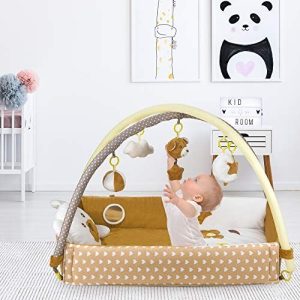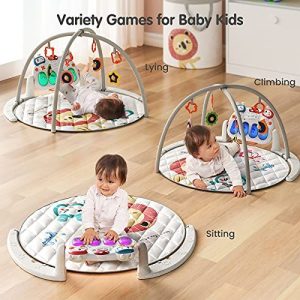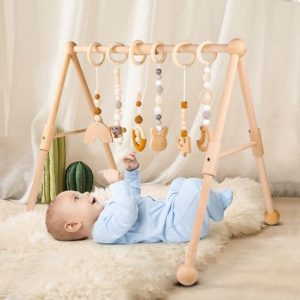Do newborns need play gyms? Newborn babies are constantly learning and growing. In the first few months of life, their brains are making important connections that will shape their development for years to come. Parents often wonder what they can do to support this critical growth.
Play gyms are a popular baby product that is marketed as a tool for stimulating development. But are they really necessary? This article will explore the benefits of play gyms and other ways to encourage your newborn’s development.
What is a Play Gym?
A play gym is a soft, padded mat with overhead arches that hold dangling toys. Some play gyms also include features like mirrors, crinkly fabrics, and playmats with different textures.
Benefits of Play Gyms
Play gyms can offer several benefits for newborns:
Sensory Stimulation:
The variety of colors, textures, and sounds in a play gym can help to stimulate your baby’s developing senses.
Motor Skill Development:
As your baby reaches for and bats at the toys on the gym, they are strengthening their muscles and improving their hand-eye coordination.
Tummy Time:
Play gyms can provide a comfortable space for tummy time, which is important for strengthening your baby’s neck and back muscles.
Alternatives to Play Gyms
While play gyms can be a helpful tool, they are not essential for newborn development. There are many other ways to stimulate your baby’s senses and encourage their development:
- Tummy Time on a Blanket: A safe, flat surface is all you need for tummy time. You can place a few interesting toys in front of your baby to encourage them to lift their head and look around.
- High-Contrast Books: Newborns can see best in black and white and shades of gray. High-contrast books with bold patterns can be visually stimulating for them.
- Homemade Mobiles: You can create a mobile for your baby using household items like ribbons, colorful scarves, or crinkly paper.
- Singing and Talking: Talk to your baby in a sing-song voice and narrate your activities throughout the day. This will help to stimulate their brain development and language skills.
Choosing Age-Appropriate Activities
Newborns have limited attention spans and can easily become overstimulated. It’s important to choose activities that are appropriate for their age. Here are some tips:
- Keep it Short: Newborn play sessions should only last for a few minutes at a time.
- Focus on One Sense at a Time: Don’t overwhelm your baby with too many sights and sounds at once.
- Follow Your Baby’s Cues: If your baby seems fussy or disinterested, take a break and try again later.
The Importance of Floor Play
While some baby products like swings and bouncers can be fun for short periods, unstructured floor play is essential for newborn development. During floor play, your baby has the freedom to move around, explore their surroundings, and practice their gross motor skills.
Here are some ideas for encouraging floor play:
- Provide a Safe Play Space: Clear a safe area on the floor where your baby can roll, crawl, and explore.
- Rotate Toys Regularly: This will help to keep your baby interested and engaged.
- Get Down on the Floor with Your Baby: This will show your baby that you are interested in playing with them and will help to build your bond.
Play gyms can be a fun and stimulating addition to your baby’s play space. However, they are not a necessity. There are many other ways to encourage your newborn’s development through simple activities and everyday interactions.
The most important thing is to provide your baby with a safe and loving environment where they can feel free to explore and learn.
Playtime Safety Tips
Playtime, whether with a play gym or other objects, should always be supervised. Here are some safety tips to keep in mind:
- Choose age-appropriate toys: Make sure toys are large enough that your baby can’t choke on them. Avoid toys with small parts or sharp edges.
- Keep the play area clear: Remove any tripping hazards or objects that could fall on your baby.
- Place your baby on a safe surface: The play area should be on a flat, padded surface.
The Joy of Discovery
The most important thing is to create a loving and stimulating environment for your newborn. Whether you use a play gym, homemade mobiles, or simply sing songs and chat with your baby, focus on connecting and having fun together.
Newborns learn best through exploration and interaction. By providing opportunities for your baby to discover the world around them, you’ll be setting them up for success in the months and years to come.
Considering Cost and Space
Play gyms can be a great addition to your baby’s playtime, but they aren’t the only option. Here are some factors to consider when deciding if a play gym is right for you:
-
Cost: Play gyms can range in price from affordable to expensive. If you’re on a tight budget, there are many other ways to stimulate your baby’s development without breaking the bank.
-
Space: Play gyms can take up a significant amount of floor space. If you live in a small apartment, you might prefer to use other space-saving options for playtime.

The Benefits of Everyday Interactions
The good news is that you don’t need a lot of fancy toys to help your newborn develop. The everyday interactions you have with your baby are some of the best ways to stimulate their senses and encourage learning. Here are a few ideas:
-
Make eye contact and smile: Newborns are social creatures who thrive on interaction. Smiling and making eye contact with your baby will help them feel loved and secure.
-
Sing songs and recite rhymes: Singing and talking to your baby exposes them to language and helps them develop their communication skills.
-
Take your baby for a walk: A walk outdoors can provide your baby with fresh air, sunlight, and exposure to new sights and sounds.
-
Play peek-a-boo: This simple game is a great way to help your baby learn about object permanence and develop anticipation skills.
By incorporating these activities into your daily routine, you’ll be providing your newborn with the stimulation and interaction they need to thrive.
When to Seek Professional Advice
If you have any concerns about your baby’s development, it’s always best to consult with a healthcare professional. They can assess your baby’s individual needs and provide guidance on how to best support their growth.




